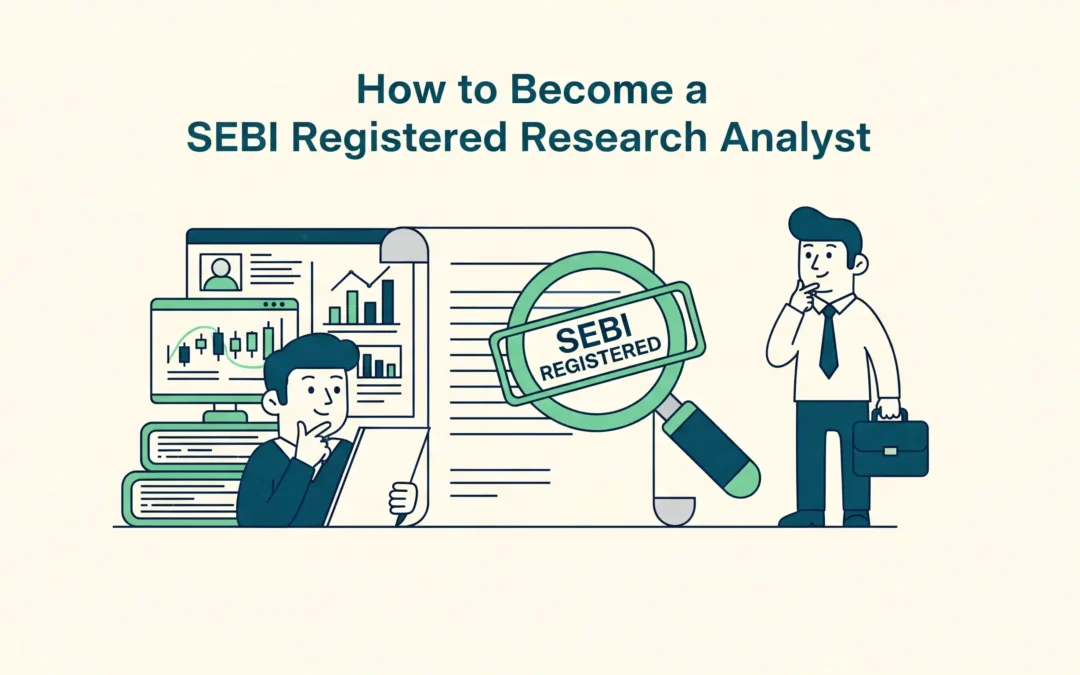SEBI governs the stock market in India and is a reputable body. Being a SEBI-registered research analyst is a good career option and a milestone that most individual in the finance field wants to achieve. But how to become a SEBI-registered research analyst? Is it difficult to become one? What are the eligibility criteria?
This article will help you understand the procedure, eligibility, and work of a research analyst. It will enhance your knowledge in this field and help you become one if you wish to be.
What is a Research Analyst?
To assist investors in making well-informed decisions, research analysts examine market trends, company fundamentals, financial reports, and industry advancements. Their responsibility is to evaluate information and offer objective analysis, frequently in the form of reports or suggestions.
Key Features:
- Using financial statements, trends, and ratios, assess the performance of the company.
- They use technical and fundamental analysis to predict future performance
- They can work on a research report and give recommendations like buy, sell, or hold.
- They can either work independently or with an Asset Management Company.
- To legally publish or offer stock investment advice in India, one must be registered with SEBI.
How to Become a SEBI Registered Research Analyst?
Let us look at the steps to become a research analyst who is registered with SEBI, including the eligibility:
Eligibility Criteria:
| Requirement | Details |
| Educational Qualification | Post-graduate degree or diploma in Finance, Economics, Commerce, Business Management, Capital Markets, Accountancy, or equivalent fields; OR a graduate degree in any discipline with at least five years of relevant work experience; OR professional qualifications like CFA or a one-year Post Graduate Program from NISM. |
| Certification | NISM Series-XV: Research Analyst Certificate (Mandatory) |
Step-by-Step Registration Process:
1. Successfully complete the NISM Series-XV Certification Test
For anyone wishing to register as a Research Analyst, the National Institute of Securities Markets (NISM) requires this certification. It includes:
- Fundamentals of Research
- Methods of Valuation
- Both quantitative and qualitative analysis
- SEBI’s Legal and Regulatory Guidelines
- Research Ethics
Exam structure:
- There are 100 multiple-choice questions.
- 60% is the passing score.
- 25% of points are deducted for each incorrect response.
- The cost ranges from Rs. 1,500 to Rs. 2,000.
2. Collect the necessary documents.
Get scanned copies (in PDF format) of the following before beginning your application:
| Document | Purpose |
| PAN Card & Aadhaar Card | Identity and address proof |
| Educational Certificates | To prove the qualification criteria |
| NISM XV Certificate | Proof of passing the mandatory exam |
| Experience Certificate | To show relevant experience (min. 1 year) |
| Passport-sized Photo (JPEG format) | For identification in SEBI records |
| Net Worth Certificate (if required) | For individual applicants, issued by CA |
| Undertaking Letter & Declaration | Format available on the SEBI website |
3. Register on the SEBI Intermediary Portal
- Go to the official SEBI Intermediary Portal at https://intermediary.sebi.gov.in.
- Create your user ID and password after choosing the Research Analyst category.
- Complete the application form after creating your login credentials.
4. Complete Form A, the online application.
To register as a Research Analyst, log in and complete Form A.
Give:
- Personal information
- Qualifications in education
- Experience in the workplace
- Details of certification
- Upload every document listed in Step 2.
- Before submitting, carefully go over everything.
5. The SEBI registration fees must be paid.
Two different kinds of fees are involved:
| Type of Fee | Amount | Payable To |
| Application Fee | Rs. 5,000 | SEBI (non-refundable) |
| Registration Fee | Rs. 5,000 (for individuals) or Rs. 50,000 (for bodies corporate/firms) | On approval by SEBI |
6. SEBI Review of the Application
SEBI will check your documents and information after they are submitted.
They might:
- Ask for clarification on a few details.
- Ask for resubmission of any unclear documents
- Timeline: Depending on workload and document accuracy, approval typically takes 4–6 weeks.
7. Obtain a Certificate of SEBI Registration
- After everything has been confirmed and authorised, you will get:
- Certificate of SEBI Registration
- A distinct registration number that needs to be included in all correspondence and reports
Prospects for a Career as a Research Analyst
Let us now look at the career options you can pursue after getting registered with SEBI as a research analyst:
- Equity Research Analyst: Collaborate with advisory firms, investment banks, or stockbroking firms to analyse stocks and industries.
- Analyst on the buy-side: Participate in hedge funds, mutual funds, or pension funds to assist in portfolio investment selection.
- Analyst on the sell-side: Provide research reports and recommendations to clients and the general public while working for broking firms.
- Freelance/Independent Research Analyst: Create your own brand or advisory platform (website, YouTube, etc.) and provide stock research in a legal manner.
- Content Producer or Financial Journalist: Write insightful, fact-based articles for blogs or publications about stocks, markets, and personal finance; registration with SEBI is needed only if you provide formal investment advice or recommendations.
- Manager of Portfolios and Wealth: To manage or organize client portfolios professionally, a separate SEBI registration as a Portfolio Manager is required, in addition to the research analyst registration.
Bottomline
The conclusion can be drawn that becoming a SEBI-registered research analyst requires the individual to follow certain steps. One of them is to pass the NISM series XV exam for a research analyst with 60% marks. It is important to meet the eligibility criteria along with the certification that is listed above and follow the necessary steps.
It will open various career options like an analyst on the buy side or sell side, a portfolio manager, or even a freelance analyst.


